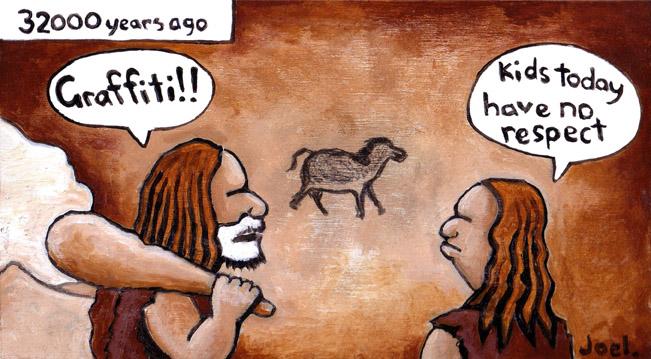2 hours ago
Sunday, June 14, 2015
Teaching Summer School to Kids Today
I am teaching summer school -- just one class this year, down from three or four, which is my normal load, and Comp II, which is my second to least favorite class to teach. (Comp I is my least favorite.)
This is not to say that I don't like teaching Comp II. I love teaching, even Comp. But given a choice, is what I am saying, in a perfect world, is what I am saying, I'd pick teaching -- say -- Working Class Literature, or Major Authors: Octavia Butler, over yet another section of Comp II (which I have taught teach every single semester, very nearly, in one form or another, since I began this job, back when I was a young pup of a graduate instructor, twenty-six years old, with no idea of what I was doing).
In any case! With only one class, which has a relatively low enrollment -- 18 students -- the workload is not onerous. And these students are lovely. This has also been pleasant.
People keep asking me that, by the way. "How are the students?" they ask. "Are they terrible?"
Because this is the narrative in America today, that all of our students are getting worse and worse, that kids today can't write and won't read, and won't do the work, and are just losers.
I have not found this to be the case at all. I do have the occasional difficult student, yes -- entitled in some way; or poisoned by some ideology which keeps them from learning; or just so overloaded by family or work responsibilities that they don't have time for school work.
But mainly this generation of students I am finding to be not just sufficiently educated (they can write well, in other words) but also determined to be educated. They want to do the work.
Now it's true that many of them are not well read -- they don't have the canon, in other words, that I was expected to have at their age. Mention Sermon on the Mount to them, and you might as well be talking about Apuleius. Catcher In the Rye is lost to the dust. None of them even know who Thomas More is.
But this is all at least in part because the canon is no longer the canon. The world of literature is so wide now; and this is good. This is excellent, in fact. They're not reading Salinger because Salinger has so much competition that he has been left in the dust. Why read Catcher in the Rye when you can watch Howl's Moving Castle, or read Always Coming Home?
Not to mention all the movies, animes and narrative games that are available today. So yes, maybe are students aren't well-versed in the traditional canon. But that doesn't mean they are culturally empty. It only means they don't share a culture with their professors who were educated in the traditional Western Canon. (And maybe their professors need to broaden their own cultural shore.)
Kids today are all right, I guess is what I'm saying. More than all right -- they give me hope.
Subscribe to:
Post Comments (Atom)


3 comments:
I find my students much the same; they know different cultural stuff than they would have a generation or two ago, but they're mostly willing to work to learn, decent and kind to each other (and that is important), and working their rears off at jobs while they go to school.
We (well, my generation, say) have failed them by defunding education so much that they mostly have to work and take on loans to go to college. But the students are every bit as smart as any generation, as willing to work hard.
I wonder if the perspective is different in humanities vs. STEM? I teach in STEM, and I also am teaching a summer session. I find the students in the past 5 years have had declining math skills and require more remediation. I also find that they 'give up' more easily. The idea of practice making perfect is lost to them.
I think they are perfectly nice people, but I am wondering where the grit went.
Hmm. Mine don't give up -- quite the opposite. (Well, obviously in every class there will be one or two students who do.) But on the whole, they will revise and revise and revise, fighting for that A.
Could it be a difference in universities? I'm at a mid-range U. My kids come from mainly working class / lower middle-class families.
Post a Comment